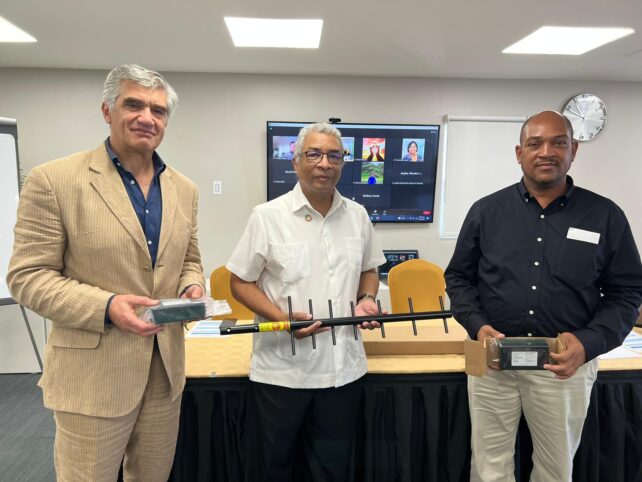
The Office of Disaster Management (ODM) held an event dubbed: ‘Connecting Communities for Climate and Disaster Risk Preparedness (CCC-DRIP) Initiative; a Research-Based Approach in Dominica Project.’
At the session which took place on Wednesday, October 19, at the Fort Young Hotel, CCC-DRIP noted that the general objective is to increase Dominica’s social and economic resilience to natural hazards including climate change by improving: data gathering, risk estimation, and developing components of Early Warning Systems (EWS) that involve local stakeholders and public-private partnerships – while producing lessons for at-risk coastal communities.
The Initiative is being led by The University of the West Indies (UWI), through the Institute for Sustainable Development (ISD) in Dominica with funding from the International Development Research Centre (IDRC) of Canada, and with counterpart funding by The University of the West Indies. ODM is the local implementing partner of the project here in Dominica.
In his speech, The National Disaster Coordinator, Fitzroy Pascal said that due to this project Dominica will soon have a revised and modernized national disaster plan from that which was originally developed in 2001.
“The revised plan details actions for planning, preparedness, recover, and response, to the many hazards that can impact Dominica including hydro, metrological, and seismic-related events and the use of modern technology and [advanced] scientific approaches.”
He said it is a known fact that Dominica is highly prone to multiple hazards including volcanic activity, landslides, pandemics, earthquakes, and tropical cyclones and in order to reduce vulnerability to these often unavoidable hazards, enhancement must be done to Dominica’s capacity to generate data and provide the citizenry with accurate information to support their planning and decision making.
“In this regard, the national disaster mechanism encourages partnership with donors and academic institutions like UWI and other global development partners to build capacity towards providing more efficient and effective disaster risk management in Dominica.”
Pascal hopes that Dominica will have more precise and localized hard maps for earthquakes, floods, and landslides, better templates for hazard vulnerability and capacity assessments and the integration of related disaster risk reduction initiates in the learning curriculum of all levels of our education system
It was noted that to date, the project team has been visiting Dominica and has trained over 100 stakeholders in the use of appropriate software to assist with disaster risk management efforts.
Seismic research has also been conducted, and communications equipment has been purchased to assist with early warning efforts. Furthermore, the project will be moving ahead with research in flood and landslide susceptibility.
The IDRC said the project aims to collect, use and integrate a range of existing and new sources of data: physical, climatological, social, and economic sources and will also identify data gaps. New technologies and advances in data management will also be used to develop multi-dimensional hazard and vulnerability mapping to prepare disaster risk management (DRM) programs and early warning systems.


I hope the revised and modernized national disaster plan will give attention to the ongoing situation at Antrim. The land slippage was triggered by what has been described as one of the worst civil engineering blunders in the history of the Caribbean.
Twelve years ago the situation was considered critical and warranted daily site inspections under the leadership of the then ODM Program Officer, Don Corriette.
(https://dominicanewsonline.com/news/homepage/news/accidents-tragedy/antrim-land-slippage-worse-than-predicted-%E2%80%93expert-investigates/)
In more recent times, site visits by the Office of Disaster Management have been few and far between. Furthermore, ad hoc attempts by the Ministry of Public Works to remedy the blunder have been flawed and totally ineffective.